Address: Bredgatan 13, SE-221 00 Lund, Sweden
Web page: http://www.soch.lu.se/
Contact persons: Associate Professor Jan Magnusson, phone: +46 (0)46 222 3161
Teres Hjärpe, International Coordinator, phone: +46 (0)46 222 91 99

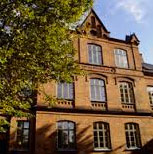 The School of Social work has been training social workers since 1947. It was integrated into Lund University in 1977, as a department within the Faculty of Social Sciences. The School of Social Work has approximately 120 employees and 1,200 bachelor and master students. Its facilities are centrally located in Lund and on the Helsingborg campus.
The School of Social work has been training social workers since 1947. It was integrated into Lund University in 1977, as a department within the Faculty of Social Sciences. The School of Social Work has approximately 120 employees and 1,200 bachelor and master students. Its facilities are centrally located in Lund and on the Helsingborg campus.
The research of the department has been wide in range, but has concentrated on some central research areas and programmes. Areas where the research is the most comprehensive are Profession and Professionalism in Social Work; Social- and Welfare Policy; Methods and Interventions; Child, Youth and Family; The Civil Society and Users Perspectives; Organization and Organizations in Social Work; Crime and Crime Victims; Marginalization and Poverty; Aging and Elderly Care; Addiction and Treatment of Addicts and finally Migrants and Migration
South Asia related activities
The School of Social Work has sent several batches of students on field work trips to India. For many years up till 2007 this was done through the SWEDEN-INDIA Project, as it is called. This is an Indian-Swedish educational project providing experiential, field based training programme for social work students, organised by Örebro University since 1994. More information.
Lund University also decided to organise their own fieldwork arrangements in India and 5–6 students went to India every year, the latest one to Bangalore, where the School of Social Work had a collaboration agreement with Christ University.
In March 2011, another agreement on collaboration was made with Tata Institute of Social Sciences (TISS) in Mumbai. This collaboration became even stronger since a formal Linnaeus Palme Exchange Programme application was granted by the International Programme Office for Education and Training (Internationella Programkontoret) from 2012. The School receives SEK 378 736 for the period 2014-15 for teacher- and student exchanges with TISS. More information about the South Asia related Linnaeus Palme projects for 2014-15.
Students also conduct studies in South Asia within the Minor Field Study-programme. During 2013, three students have been awarded scholarships for data collection for bachelor theses in India. Kaisa Nylin went to Bangalore in April to interview Indian family therapists. Sara Häll and Katja Evasdotter are interested in feministic perspectives within the Lalitha project in Tiruchirapali in Tamil Nadu and will travel there in November 2013.
South Asia related research at the department
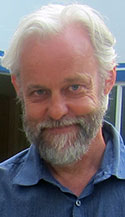
 Associate Professor Jan Magnusson, closely connected to SASNET from the beginning (being its first webmaster, and later being a member of the board), was based at the Centre for East and South-East Asian Studies (ACE) from 2003 till 2005, developing and coordinating the then brand new Masters programme in Asian Studies. Since 1 January 2006 he is however back at the School of Social Work, his home institution, where he defended his PhD thesis about Swedish street papers (”Ny situation – ny organisation. Gatutidningen Situation Sthlm 1995–2000”) in 2002 (more information about the thesis).
Associate Professor Jan Magnusson, closely connected to SASNET from the beginning (being its first webmaster, and later being a member of the board), was based at the Centre for East and South-East Asian Studies (ACE) from 2003 till 2005, developing and coordinating the then brand new Masters programme in Asian Studies. Since 1 January 2006 he is however back at the School of Social Work, his home institution, where he defended his PhD thesis about Swedish street papers (”Ny situation – ny organisation. Gatutidningen Situation Sthlm 1995–2000”) in 2002 (more information about the thesis).
Jan Magnusson participated in the SASNET workshop on ”The role of South Asia in the internationalisation of higher education in Sweden” held in Stockholm 28-29 November 2006, where he gave a presentation about experiences from the masters programme both in the session dealing with ”South Asian students in soft sciences in Sweden” (read the presentation, as a pdf-file); and in the session dealing with ”Sending students to South Asia” (read this presentation, as a pdf-file).
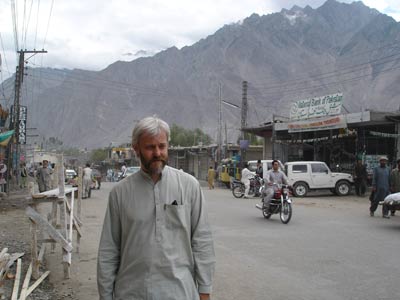 For several years Dr. Magnusson has been involved in Tibetan studies, looking especially at the social dynamics and development of the Tibetan refugee community in India. He has also initiated a research project dealing with the so called Baltistan movement and the revival of Tibetan identity in Baltistan (an area located in the north eastern part of Pakistan). At the Development studies research conference in Lund in January 2003 he presented a paper titled ”The Baltistan Movement and the Emergence of Tibetan Identity in the Northern Areas of Pakistan”. Read the abstract.
For several years Dr. Magnusson has been involved in Tibetan studies, looking especially at the social dynamics and development of the Tibetan refugee community in India. He has also initiated a research project dealing with the so called Baltistan movement and the revival of Tibetan identity in Baltistan (an area located in the north eastern part of Pakistan). At the Development studies research conference in Lund in January 2003 he presented a paper titled ”The Baltistan Movement and the Emergence of Tibetan Identity in the Northern Areas of Pakistan”. Read the abstract.
In August 2003 Jan Magnusson was awarded 70 000 SEK as a SASNET planning grant to develop the research project about the Baltistan Movement (”The Baltistan Movement in the Northern Areas, Pakistan”). The object of study has been national and political identities in a region consisting of not only Baltistan, but also of Kargil and Ladakh in India.
Partners in the project have been Ole Jensen from the International Development Studies, Roskilde University, Denmark, and Mohammad Hassan from Skardu College in Pakistan. In summer 2004 the team carried out field work in Baltistan and met with political and cultural activists as well as radical journalists. The results of the fieldwork was first presented in a panel at the Tenth International Seminar of Tibetan Studies held in Oxford, UK, in September 2003. Data collected in Baltistan in 2004 were later used for a paper called ”The Baltistan Movement: Tibetan History and Identity in the Northern Areas of Pakistan” appearing in a volume called ”Tibetan Borderlands”, edited by Dr P Christiaan Klieger, and published by Brill.

In 2005 the team planned to work in Kargil and Ladakh. The purpose was to look at Balti influence as well as to trace cross-border interaction and establish contacts for future studies. Ole Jensen withdrew from the project in early 2005, and unfortunately Mohammad Hassan got his Indian visa application rejected. Jan Magnusson went to Ladakh on his own, and spent about a month in Ladakh, Kargil and Nubra during the summer 2005 where he met with local leaders and intellectuals to talk about Ladakh’s and Kargil’s relationship to Baltistan and future scenarios. He also interacted with Dr Sonam Joldan, a researcher living in Ladakh and recently got his PhD in Political Science from JNU in New Delhi.
Project description: Due to the recent anti-Islamic sentiments in Ladakh Magnusson found the Ladakhi attitude towards Baltistan rather negative, and many of the persons he spoke to seemed to fear an opening of the border. The primary reason for this was the possibility of Balti dominance as the combined Balti population on both sides of the border outnumbers the Ladakhis. In Kargil, by contrast, the attitude was extremely positive. This is due to the fact that about 80 percent of the population there is of Balti decent. For the last decade Kargil, like Baltistan, has experienced a cultural revival, and are in fact a main producer of Balti cultural products. Interaction between Kargil and Baltistan is increasing, not so much as a cross-border activity but more as meetings during pilgrimage to Mecca and other places in the Middle East as well as religious schools mainly in Iran. People in Kargil have high hopes for an opening of the border.
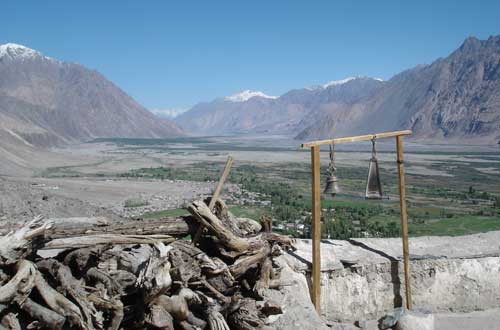
During his visit in Kargil, Magnusson realized that the Balti movement is just as strong there as it is in Baltistan itself, something that may have very interesting trans-Himalayan consequences. Magnusson also visited Nubra, two valleys north of the Ladakh Range. Nubra river valley runs north up to the Siachen glacier area while the Shyok river valley runs north-west up into Baltistan (unfortunately most of the Shyok valley is still a restricted area which only allowed him to go as far down the valley as a short distance beyond the village Hunder. The majority of Baltis in the area reside farther down the valley, mainly in the village Turtuk. Some of the villages in the valley were annexed by India during the 1971 war. 60-70 percent of the Baltis who live there are Nurubakshi muslims. They are comparatively well organized and run a welfare organization called Skarchen. Skarchen is in close contact with Kargil for instance in the production of Balti music recordings. It was originally intended to care only for the Baltis but has extended its activities to all people living in the Nubra area.
In October 2004 Magnusson was given a small Swedish Research Links grant for another Tibet related research project, now titled ”Life strategies in long-term refugee settlements: The social dynamics of the Tibetan refugee settlement Lugsum Samdupling in Karnataka, India”. The project is carried out in cooperation with Dr Subramanya Nagarajarao, Indian Research Institute, Mysore and Dr Geoff Childs, Dept. Of Anthropology, Washington University, St Louis., USA.
Project Abstract: The general aim of the project is to study the life strategies that are developed by refugees in long-term camp settings and the social dynamics they create within the community and with the local environment. More specifically the project looks at these dynamics in the six camps of the first of the Tibetan refugee settlements established in India, namely in Bylakuppe, Lugsung Samdupling, from 1961 and up until present day. This case can serve as an example of many lessons when it comes to the understanding of the social dynamics at work in long-term refugee situations. More specifically the project studies the demographic development in the settlement population, and the interplay and interaction between the settlement and its local environment over time. It also looks at changes in the refugees´way of life and how the community has been socially reconstructed.
The project included a workshop to explore the possibilities of extending a study of Tibetan refugee settlements in the south Indian state of Karnataka, also to settlements and scattered communities in other places all over India. A report from the symposium is published at ACE’s website. More information on the 2004 Swedish Research Links grants.
Other South Asia related activities
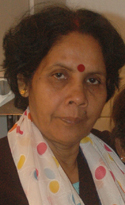 On Wednesday 16 September 2009, the School of Social Work at Lund university hosted a seminar with Dr. Ruby Sain from the Dept. of Sociology, Jadavpur University, Kolkata, India. The seminar was organised in collaboration with Vårdalinstitutet (The Swedish Institute for Health Sciences), and SASNET.
On Wednesday 16 September 2009, the School of Social Work at Lund university hosted a seminar with Dr. Ruby Sain from the Dept. of Sociology, Jadavpur University, Kolkata, India. The seminar was organised in collaboration with Vårdalinstitutet (The Swedish Institute for Health Sciences), and SASNET.
Dr. Sain, who mostly works on health, illness, ageing, religion and research methodology issues, talked about “Depression – a social problem of the elderly population in India”. She is the founding editor of the Jadavpur University Journal of Sociology, and her forthcoming books are titled ”Contemporary Social Problems in India-Vol I” (ed.) and ”Folk Religion in Bengal”. Besides, Dr Sain is secretary of the International Forum for the Study of Society and Religion (IFFSR), a forum that links researchers and scholars from Jadavpur University, University of Gothenburg and the Oxford Center for Hindu Studies.
She came to Sweden on a SASNET guest lecture programme grant, invited by the Department of Literature, History of Ideas, and Religion, Gothenburg University, and Vårdalinstitutet, Lund University. More information.

 On Tuesday 14 February 2012, Sheba Saeed, PhD candidate in History, Film and Television at the University of Birmingham, UK, visited SASNET’s office in Lund to meet deputy director Lars Eklund. Sheba, a solicitor by profession, is a guest researcher at the Nordic Institute of Asian Studies (NIAS) in Copenhagen, during the month of February 2012. Her PhD research project focuses on the begging phenomenon in Mumbai, India, using criminological theory. A topic quite similar to her previous MPhil thesis project on Beggars of Lahore, which resulted in a documentary film as part of an audio-visual dissertation. This film, “Beggars of Lahore” (more information about the film), has been screened at international conferences and film festivals, and Ms. Saeed has also made a successful Beggars of Lahore photo exhibition, first shown in 2009.
On Tuesday 14 February 2012, Sheba Saeed, PhD candidate in History, Film and Television at the University of Birmingham, UK, visited SASNET’s office in Lund to meet deputy director Lars Eklund. Sheba, a solicitor by profession, is a guest researcher at the Nordic Institute of Asian Studies (NIAS) in Copenhagen, during the month of February 2012. Her PhD research project focuses on the begging phenomenon in Mumbai, India, using criminological theory. A topic quite similar to her previous MPhil thesis project on Beggars of Lahore, which resulted in a documentary film as part of an audio-visual dissertation. This film, “Beggars of Lahore” (more information about the film), has been screened at international conferences and film festivals, and Ms. Saeed has also made a successful Beggars of Lahore photo exhibition, first shown in 2009.
Sheba Saeed had been invited to visit Lund University by Teres Hjärpe, international co-ordinator at the School of Social Work, and she accompanied Sheba to SASNET. The School of Social Work is currently expanding its South Asia oriented activities and SASNET is actively promoting this development.
(Teres Hjärpe and Sheba Saeed on photo)
More information about Sheba Saeed and her projects on her personal web page.

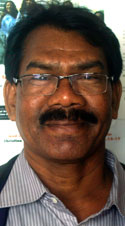 On Thursday 23 May 2013, Professor Helarius Beck, Dean at the School of Social Work, Tata Institute of Social Sciences (TISS) in Mumbai, India, visited SASNET ’s office at Lund University and met its deputy director Lars Eklund. Prof. Beck had come to Lund as a TISS representative in planning for the new Linnaeus Palme exchange programme between his school at TISS and the School of Social Work at Lund University.
On Thursday 23 May 2013, Professor Helarius Beck, Dean at the School of Social Work, Tata Institute of Social Sciences (TISS) in Mumbai, India, visited SASNET ’s office at Lund University and met its deputy director Lars Eklund. Prof. Beck had come to Lund as a TISS representative in planning for the new Linnaeus Palme exchange programme between his school at TISS and the School of Social Work at Lund University.
During a week-long stay at Lund University, Prof. Beck participated in a one-day seminar day focused on Internatinal studies and international assignments for Social Work students, but he also took part in teaching activities in the courses on “Participatory Methods of Change and Development” och “Professional Social Work”.
In his research, Helarius Beck focuses on the still prevailing practice of manual scavenging in India. In 2005, he published an article entitled ”Socioeconomic status of scavengers engaged in the practice of manual scavenging in Maharashtra” together with TISS researcher colleague Shaileshkumar Darokar. They identified the numbers of scavengers, their socio-economic status, and assess training needs and alternative avenues of employment. A ‘manual scavenger’ is a person engaged in manually removing human excreta. In 1993 legislation was passed in India to ban manual scavenging, but has not been widely implemented. Since allocation of labour on the basis of caste is one of the fundamental tenets of the Hindu caste system, Dalits have been assigned to carry out this which is deemed ritually polluting by other caste communities.